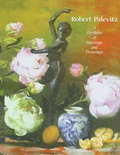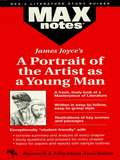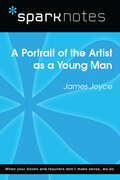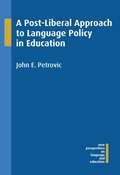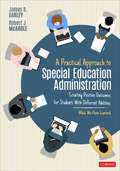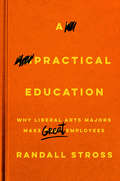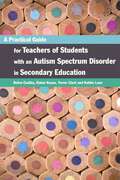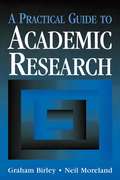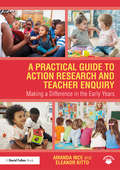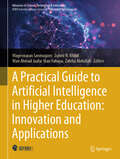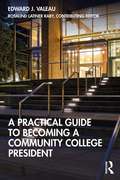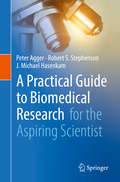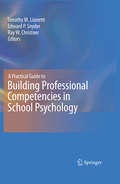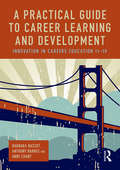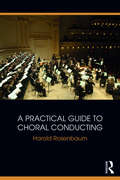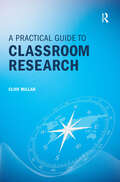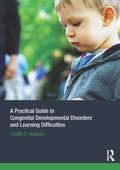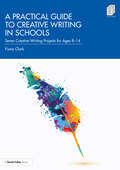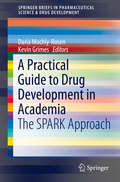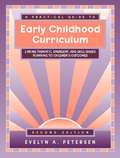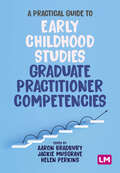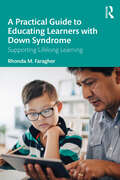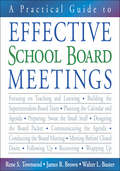- Table View
- List View
A Portfolio Of Paintings And Drawings
by Robert PalevitzFirst Published in 2005. Routledge is an imprint of Taylor & Francis, an informa company.
A Portrait of the Artist as a Young Man (MAXNotes Literature Guides)
by Matthew MitchellREA's MAXnotes for James Joyce's A Portrait of the Artist as a Young Man MAXnotes offer a fresh look at masterpieces of literature, presented in a lively and interesting fashion. Written by literary experts who currently teach the subject, MAXnotes will enhance your understanding and enjoyment of the work. MAXnotes are designed to stimulate independent thought about the literary work by raising various issues and thought-provoking ideas and questions. MAXnotes cover the essentials of what one should know about each work, including an overall summary, character lists, an explanation and discussion of the plot, the work's historical context, illustrations to convey the mood of the work, and a biography of the author. Each chapter is individually summarized and analyzed, and has study questions and answers.
A Portrait of the Artist as a Young Man (SparkNotes Literature Guide Series)
by SparkNotesA Portrait of the Artist as a Young Man (SparkNotes Literature Guide) by James Joyce Making the reading experience fun! Created by Harvard students for students everywhere, SparkNotes is a new breed of study guide: smarter, better, faster. Geared to what today's students need to know, SparkNotes provides: *Chapter-by-chapter analysis *Explanations of key themes, motifs, and symbols *A review quiz and essay topicsLively and accessible, these guides are perfect for late-night studying and writing papers
A Post-Liberal Approach to Language Policy in Education
by John E. PetrovicThis provocative defense of language diversity works through the strengths and weaknesses of liberal political theory to inform language policy. The book presents the argument that policy must occupy the space between 'linguistics of community' and 'linguistics of contact' in a way that balances individual autonomy and group recognition while not reifying 'language'. Drawing on the importance of the language/identity link, the author distinguishes between language negative liberalism and language positive liberalism, arguing against the former. This distinction orients consideration of increasingly specific language policy issues, such as official languages, language rights, bilingual education, and uses of language varieties within classrooms.
A Practical Approach to Special Education Administration: Creating Positive Outcomes for Students With Different Abilities
by James B. Earley Robert J. McArdleYour guide to excelling in the complex role of a special education administrator The job of the administrator of special education is arguably one of the most difficult in a school district—and that complexity can be overwhelming. It requires an aspect of every administrative job in the district, including budgets, human resources, student advocacy, and curriculum and assessment. Written by two veteran special education administrators with more than 100 years of combined experience, this book shows current and aspiring special education administrators how to excel in the many demanding areas of their position, allowing them to be effective administrators and educational leaders. Among the many topics included in the book are The importance of visibility in the form of face-to-face interactions to assist staff, students, and building principals The importance of parents in the process The significance of confidentiality, due process, program development, and working with advocates Insight into decision-making and relationship-building A critical tool in any special education administrator′s box, as well as building administrators, central office administrators and school committee members, this book provides practical and friendly advice for a difficult but critical job.
A Practical Approach to Special Education Administration: Creating Positive Outcomes for Students With Different Abilities
by James B. Earley Robert J. McArdleYour guide to excelling in the complex role of a special education administrator The job of the administrator of special education is arguably one of the most difficult in a school district—and that complexity can be overwhelming. It requires an aspect of every administrative job in the district, including budgets, human resources, student advocacy, and curriculum and assessment. Written by two veteran special education administrators with more than 100 years of combined experience, this book shows current and aspiring special education administrators how to excel in the many demanding areas of their position, allowing them to be effective administrators and educational leaders. Among the many topics included in the book are The importance of visibility in the form of face-to-face interactions to assist staff, students, and building principals The importance of parents in the process The significance of confidentiality, due process, program development, and working with advocates Insight into decision-making and relationship-building A critical tool in any special education administrator′s box, as well as building administrators, central office administrators and school committee members, this book provides practical and friendly advice for a difficult but critical job.
A Practical Education: Why Liberal Arts Majors Make Great Employees
by Randall StrossThe liberal arts major is often lampooned: lacking in "skills," unqualified for a professional career, underemployed. But studying for the joy of learning turns out to be surprisingly practical. Unlike career-focused education, liberal education prepares graduates for anything and everything—and nervous "fuzzy major" students, their even more nervous parents, college career center professionals, and prospective employers would do well to embrace liberal arts majors. Just look to Silicon Valley, of all places, to see that liberal arts majors can succeed not in spite of, but because of, their education. A Practical Education investigates the real-world experiences of graduates with humanities majors, the majors that would seem the least employable in Silicon Valley's engineering-centric workplaces. Drawing on the experiences of Stanford University graduates and using the students' own accounts of their education, job searches, and first work experiences, Randall Stross provides heartening demonstrations of how multi-capable liberal arts graduates are. When given a first opportunity, these majors thrive in work roles that no one would have predicted. Stross also weaves the students' stories with the history of Stanford, the rise of professional schools, the longstanding contention between engineering and the liberal arts, the birth of occupational testing, and the popularity of computer science education to trace the evolution in thinking about how to prepare students for professional futures. His unique blend of present and past produces a provocative exploration of how best to utilize the undergraduate years. At a time when institutions of higher learning are increasingly called on to justify the tangible merits of the liberal arts, A Practical Education reminds readers that the most useful training for an unknowable future is the universal, time-tested preparation of a liberal education.
A Practical Guide for Teachers of Students with an Autism Spectrum Disorder in Secondary Education
by Kathleen Lane Elaine Keane Debra Costley Trevor ClarkStudents on the autism spectrum often face difficulties in the secondary education environment that result from a lack of awareness on the part of their teachers and peers. This guide acquaints teachers with all the information and practical tools needed to understand and support their students with autism spectrum disorders (ASD). The book presents specific, ready-to-use classroom initiatives with example worksheets, checklists and timetables to help students keep organised with their school work. It also covers general obstacles such as social situations, anxiety, mental health issues and extracurricular activities and how adults can help. Guidance about the leaving school stage and how to ensure the teen is equipped to make the best possible decisions about their future is included. Packed with useful information and examples, this book will be a lifesaving resource for teachers, and everyone else working in secondary education, who want to help their students with autism to stay focused and positive at school.
A Practical Guide to Academic Research
by Birley, Graham (Head, Education Research Unit, University of Wolverhampton) Moreland, Neil (Associate Dean, School of Education, University of Wolverhampton)Covering all aspects of research methodology, this research tool also deals with planning issues and self-management techniques needed by the researcher. It contains information on data analysis and advice for staff members needing support from their institutions to pursue research.
A Practical Guide to Action Research and Teacher Enquiry: Making a Difference in the Early Years
by Amanda Ince Eleanor KittoThis accessible guide will be an invaluable resource for early years practitioners looking to make a positive difference in their settings by using action research or teacher enquiry. Guiding readers through the practical steps, issues, and potentials of conducting research in a variety of early childhood settings, the book will increase practitioners’ confidence, enabling them to bridge the gap between recognising room for improvements and instigating necessary changes. Divided into easy-to-follow sections, A Practical Guide to Action Research and Teacher Enquiry: Making a Difference in the Early Years offers clear definitions and explanations of action research along with explanations of how it can be applied in early years settings to effectively and efficiently improve outcomes for children. Chapters outline a clear rationale for engaging in action research, highlight purposes and potentials of various approaches, and provide a helpful step-by-step discussion of the different stages of enquiry. Ten examples of practice are used to clearly illustrate the action research cycle in a variety of settings, and in relation to a range of topics and ages, thereby providing readers with a wealth of tried-and-tested ideas for application in their own settings and projects. These are supported by a range of downloadable resources which can be used as tools to support the planning, reflecting, and evaluation of practitioners’ research activities. Informative, inspiring, and highly relevant to practice, A Practical Guide to Action Research and Teacher Enquiry will support and scaffold the research activities of early years practitioners, managers, and students.
A Practical Guide to Artificial Intelligence in Higher Education: Innovation and Applications (Advances in Science, Technology & Innovation)
by Mageswaran Sanmugam Zuheir N. Khlaif Wan Ahmad Jaafar Wan Yahaya Zaleha AbdullahThis book explains how educators can use artificial intelligence in education to enhance student engagement and improve learning outcomes by sharing best practices for using AI to enhance learning quality and foster sustainable teaching. This book covers various topics related to the use of AI in education, from designing activities to using AI in teaching to using AI in assessment by following the ethical considerations of using AI in teaching. The book not only discusses the related topics to using AI in education, but also presents best practices of using AI in teaching and learning from different countries and provides best practices of ethical considerations based on lives experiences of the authors. Furthermore, the book introduces the teaching methods of integrating AI in teaching and learning. Therefore, this book offers essential information and a practical guide to using AI in education.
A Practical Guide to Becoming a Community College President
by Edward J. Valeau Rosalind Latiner RabyThis practical resource helps aspiring leaders demystify the challenges associated with becoming a community college president. Building on existing scholarship and research related to historical origins of the community college, this book explores the role and function of the presidency, discusses existing demographics and the importance of meeting the needs of a diverse student population, and unpacks the required competencies and leadership challenges related to becoming a community college president. Including real voices from award-winning and current presidents as well as a step-by-step approach to attaining the position, this is an important resource that speaks to the needs of today and tomorrows’ community college leaders.
A Practical Guide to Biomedical Research
by Peter Agger Robert S. Stephenson J. Michael HasenkamThis book advises and supports novice researchers in taking their first steps into the world of scientific research. Through practical tips and tricks presented in a clear, concise and step-wise manner, the book describes the entire research process from idea to publication. It also gives the reader insight into the vast opportunities a research career can provide. The books target demographic is aspiring researchers within the biomedical professions, be it medical students, young doctors, nurses, engineers, physiotherapists etc. The book will help aspirational inexperienced researchers turn their intentions into actions, providing crucial guidance for successful entry into the field of biomedical research.
A Practical Guide to Building Professional Competencies in School Psychology
by Edward P. Snyder Timothy M. Lionetti Ray W. ChristnerDesigned as a research-based yet matter-of-fact guide for beginning and future scientist-practitioners, A Practical Guide to Building Professional Competencies in School Psychology skillfully augments the reader's training, supervision, and experience by providing a framework for honing essential skills in the field. This reader-friendly, evidence-based text encourages the continuing development of expertise in communication and collaborative skills, diversity awareness, technical knowledge, and other domains critical to building and maintaining an ethical, meaningful practice. Each chapter in this must-have volume examines a core area of expertise in depth, and provides checklists (linked to competencies set out in NASP's Blueprint III) and the Development and Enhancement of Competencies Assessment Form are included to enable readers to gain a more complete understanding of their professional strengths and needs. The skill sets covered include: Developing cross-cultural competencies.Evaluating students with emotional and behavioral problems.Assessing student skills using a variety of approaches.Preventing and intervening in crisis situations.Consulting with families, colleagues, and the community.Facilitating mental health services in the school setting.A Practical Guide to Building Professional Competencies in School Psychology provides an invaluable set of professional development tools for new practitioners and graduate students in school psychology.
A Practical Guide to Career Learning and Development: Innovation in careers education 11-19
by Barbara Bassot Anthony Barnes Anne ChantA Practical Guide to Career Learning and Development is an essential guide for all those involved in careers education, either with sole responsibility or as part of a team. With a focus on career happiness, resilience and growth, this exciting book offers effective pedagogical strategies, techniques and activities to make career learning and development accessible and enjoyable, contributing to positive outcomes for all young people in the 11-19 phase of their education. With a wealth of support material such as teaching ideas, lesson plans, case studies and an illustrative student commentary, key topics covered include: Career Learning and Development needs of young people Career Learning and Development in the curriculum Practical activities for 11-14, 14-16 and 16-19 year olds Creating a positive environment for learning Teaching approaches Leadership and management Facilitating professional learning. A Practical Guide to Career Learning and Development is an invaluable resource for careers advisers and staff in schools with responsibility for leading and providing careers education as well as work-related learning, PSHE, citizenship, and pastoral programmes. It enables and supports all practitioners as they develop careers provision that better prepares young people for their future well-being and an ever-changing and unpredictable world of work.
A Practical Guide to Choral Conducting
by Harold RosenbaumRooted in the experience of a professional choral conductor, this book provides a guide to practical issues facing conductors of choral ensembles at all levels, from youth choruses to university ensembles, church and community choirs, and professional vocal groups. Paired with the discussion of practical challenges is a discussion of over fifty key works from the choral literature, with performance suggestions to aid the choral conductor in directing each piece. Dealing with often-overlooked yet vital considerations such as how to work with composers, recording, concert halls, and choral tours, A Practical Guide to Choral Conducting offers a valuable resource for both emerging choral conductors and students of choral conducting at the undergraduate and graduate levels.
A Practical Guide to Classroom Research
by Clive MillarThis concise and accessible book is a practical guide to qualitative classroom research, including extended case-studies of real research projects which serve as concrete examples of the advice provided. It gives a step by step account of how qualitative classroom research can be carried out and completed, with clear sets of guidelines for each stage and key points for consideration highlighted throughout. It can be read as a comprehensive guide to the research process, from beginning to end or as a resource to dip into to answer specific problems or queries.It is aimed at all college, university or school-based education students. In addition it is highly suitable for qualified teachers responding to the drive for greater evidence-based teaching in classrooms.
A Practical Guide to Congenital Developmental Disorders and Learning Difficulties
by Judith P. HudsonTo give children with congenital developmental conditions that manifest special learning needs and specific disabilities their best chance to succeed, early identification and appropriate interventions and support, is necessary. This text highlights what to look for when there are concerns about a child’s development. Practical and accessible, it is divided into three sections: Part 1 looks at the theory and policy context, discussing the social model of disability, the responsibility of health, social care and education services to the child and family and the role of reviews and assessment in recognising developmental disorders. Part 2 provides a reference guide to atypical developmental conditions and disorders. For each condition, aetiology, prominent theories and research, profile of features – including triggers and behaviours, diagnostic assessment procedures and appropriate interventions are given and links made to sources of further information and support. Part 3 explores practical issues how to work sensitively and effectively with children and their families, looking at the psychological implications of diagnosis, and how to plan, promote, deliver and evaluate multi-agency support. Designed to support professionals working within a multi-modal, collaborative approach to assessment and intervention processes, it is suitable for health visitors, allied health therapists, nurses, teachers and social care practitioners. It is also a useful reference for students in these areas learning about child development and includes critical reading exercises; online searching tasks; self-assessment questions; reflective activities and document analysis prompts.
A Practical Guide to Creative Writing in Schools: Seven Creative Writing Projects for Ages 8-14
by Fiona ClarkThis book contains seven tried-and-tested creative writing projects for pupils aged 8–14. Each project is delivered through a series of workshops and enables pupils to explore a literary genre or writing style, discuss themes and topics and receive constructive feedback about their writing. The projects cover topics such as identity, cultural heritage, tolerance, empathy, morality, dreams and much more. Teachers wanting to run creative writing projects will find this book easy to follow, practical and timesaving. Each project allows students to: • explore a certain literary genre or writing style in detail • be creative and have fun while learning • think about, talk about and discuss themes and topics • receive constructive feedback about their writing • pursue their own ideas • see themselves as ‘real’ writers with a ‘real’ audience • understand that writing can be enjoyable, artistic and relaxing • experience creativity to improve their wellbeing. These ready-made projects are invaluable for teachers who are looking for new and successful creative writing projects for a range of students. They will enable teachers to immediately start making a difference to their students’ confidence and writing skills, allowing them to be as creative and imaginative as possible and use creativity as a springboard for their own writing.
A Practical Guide to Drug Development in Academia: The SPARK Approach (SpringerBriefs in Pharmaceutical Science & Drug Development)
by Daria Mochly-Rosen Kevin Grimes"A lot of hard-won knowledge is laid out here in a brief but informative way. Every topic is well referenced, with citations from both the primary literature and relevant resources from the internet. " Review from Nature Chemical Biology Written by the founders of the SPARK program at Stanford University, this book is a practical guide designed for professors, students and clinicians at academic research institutions who are interested in learning more about the drug development process and how to help their discoveries become the novel drugs of the future. Often many potentially transformative basic science discoveries are not pursued because they are deemed 'too early' to attract industry interest. There are simple, relatively cost-effective things that academic researchers can do to advance their findings to the point that they can be tested in the clinic or attract more industry interest. Each chapter broadly discusses an important topic in drug development, from preclinical work in assay design through clinical trial design, regulatory issues and marketing assessments. After the practical overview provided here, the reader is encouraged to consult more detailed texts on specific topics of interest. "I would actually welcome it if this book's intended audience were broadened even more. Younger scientists starting out in the drug industry would benefit from reading it and getting some early exposure to parts of the process that they'll eventually have to understand. Journalists covering the industry (especially the small startup companies) will find this book a good reality check for many an over-hopeful press release. Even advanced investors who might want to know what really happens in the labs will find information here that might otherwise be difficult to track down in such a concentrated form. "
A Practical Guide to Early Childhood Curriculum: Linking Thematic, Emergent, and Skill-based Planning To Children's Outcomes
by Evelyn A. PetersenThis comprehensive book offers easy and practical systems to organize and integrate interest-based and skill-based curriculum ideas and to effectively plan for young children. It makes ongoing lesson plans easier to write, implement and monitor, and links lesson planning to both curriculum objectives and children's outcomes in all learning domains. The book provides comprehensive information on the setting of daily schedules, long and short range lesson planning, guidance/classroom management, and trends and priorities in the field. Diagrams, lesson plan forms, illustrations, and developmentally sequenced activity tables help teachers organize scaffolded experiences in all learning domains. The book also describes implementation that meets the diverse and changing needs of every child from the beginning to end of the year.
A Practical Guide to Early Childhood Studies Graduate Practitioner Competencies
by Jackie Musgrave Helen Perkins Aaron BradburyWhat do the Early Childhood Studies Graduate Practitioner Competencies (GPCs) mean in practice? What do they look like in settings? This book brings you case studies as examples of good practice demonstrating all of the GPCs. Each chapter covers a specific competency and includes: A visualisation of the competency Case studies to explore what each competency looks like in practice Expert commentary on each case study helping you to link theory to practice
A Practical Guide to Early Childhood Studies Graduate Practitioner Competencies
by Jackie Musgrave Helen Perkins Aaron BradburyWhat do the Early Childhood Studies Graduate Practitioner Competencies (GPCs) mean in practice? What do they look like in settings? This book brings you case studies as examples of good practice demonstrating all of the GPCs. Each chapter covers a specific competency and includes: A visualisation of the competency Case studies to explore what each competency looks like in practice Expert commentary on each case study helping you to link theory to practice
A Practical Guide to Educating Learners with Down Syndrome: Supporting Lifelong Learning
by Rhonda M. FaragherEducating learners with Down syndrome can seem daunting at first, but this practical guide for teachers and carers to using evidence-based practices shows you how. Taking a unique lifespan, curriculum-based approach, Rhonda M. Faragher promotes the understanding that people with Down syndrome are a diverse group with vast potential and varied learning needs. The book covers core learning areas such as literacy, numeracy, mathematics, science, and the Humanities, and features key points from the research literature, teaching strategies, practitioner vignettes, and personal stories from people with Down syndrome. It considers learning from birth and early intervention, through primary and secondary school, to post-secondary education and into various contexts of adulthood. Drawing on the latest research, this guide for educators is rich with strategies, as well as tips from other parents and teachers, providing an accessible and empowering resource for the delivery of quality education to benefit learners with Down syndrome.
A Practical Guide to Effective School Board Meetings
by Rene S. Townsend James R. Brown Walter L. BusterNow superintendents can turn board meetings into productive, results-getting events that help them focus on teaching and learning to achieve district goals.
